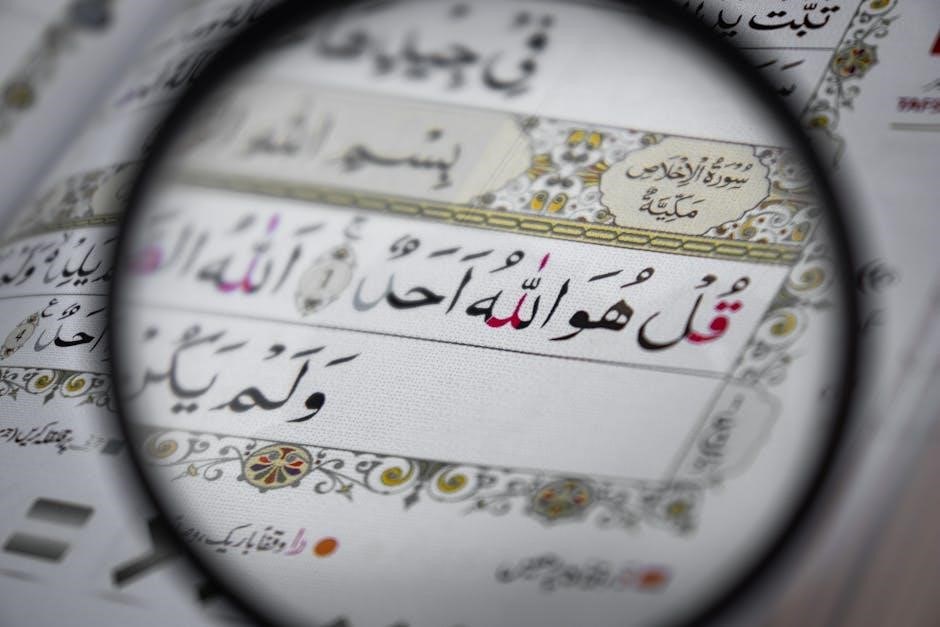
surah abasa pdf
Surah Abasa, the 80th chapter of the Quran, was revealed in Mecca. Its title, “He Frowned,” reflects an incident with the Prophet Muhammad (peace be upon him) and a blind man. This surah emphasizes patience, trust in Allah, and humility, offering profound lessons for believers.
1.1 Overview of Surah Abasa
Surah Abasa, the 80th chapter of the Quran, consists of 42 verses. Revealed in Mecca, it addresses themes of trust in Allah, patience, and humility. The title “Abasa” translates to “He Frowned,” referencing an incident where the Prophet Muhammad (peace be upon him) was approached by a blind man seeking guidance. The surah underscores the importance of prioritizing spiritual duties over worldly concerns, offering timeless lessons for believers.
1.2 Historical Context and Revelation
Surah Abasa was revealed in Mecca during a period of intense missionary efforts by Prophet Muhammad (peace be upon him). The surah’s revelation is tied to an incident involving a blind man, Ibn Umm Maktum, who sought guidance from the Prophet. This event highlights themes of trust in Allah’s plan and humility, emphasizing the importance of balancing worldly interactions with spiritual duties. The surah serves as a reminder of divine wisdom and patience.
1.3 Title and Meaning of “Abasa”
The title “Abasa” translates to “He Frowned,” referring to an incident where Prophet Muhammad (peace be upon him) frowned at a blind man, Ibn Umm Maktum, who interrupted him while he was preaching to a group of leaders. This event led to the revelation of the surah, emphasizing trust in Allah’s plan and the importance of humility and service to all, regardless of social status.

Themes and Lessons from Surah Abasa
Surah Abasa teaches patience, trust in Allah, and humility. It emphasizes serving all people equally and understanding divine wisdom in life’s challenges and interactions daily.
2.1 Patience and Trust in Allah’s Plan
Surah Abasa underscores the importance of patience and trust in Allah’s plan. It teaches believers to remain steadfast during challenges, understanding that divine wisdom often unfolds beyond human comprehension. The surah highlights Prophet Muhammad’s (peace be upon him) calm demeanor when interrupted by a blind man, illustrating the value of trust and submission to Allah’s will, even in unexpected situations, to guide believers in their faith journey.
2.2 The Story of the Blind Man (Ibn Umm Maktum)
Surah Abasa narrates the story of Ibn Umm Maktum, a blind companion who interrupted Prophet Muhammad (peace be upon him) while he was engaged with a group of leaders. The Prophet’s initial displeasure is noted, but the Quran promptly reminds him of the importance of attending to all individuals, regardless of status. This teaches believers about equal treatment and the value of every person in Islam, emphasizing humility and compassion.
2.3 Lessons on Humility and Service to Others
Surah Abasa underscores the importance of humility and serving others. The Prophet’s interaction with Ibn Umm Maktum teaches that every individual deserves attention and kindness, regardless of their social status. The Quran emphasizes that true faith is demonstrated through compassion and equality. This lesson inspires believers to embrace humility and prioritize serving others, reflecting the divine values of justice and mercy in Islam.

Linguistic and Literary Features of Surah Abasa
Surah Abasa showcases unique linguistic styles, including oaths, rhetorical questions, and vivid imagery, which emphasize divine truths and moral lessons, enriching its literary and spiritual impact.
3.1 Unique Linguistic Styles in the Surah
Surah Abasa employs distinct linguistic styles, such as oaths and rhetorical questions, to emphasize divine truths. Its vivid imagery and emotional tone convey moral lessons effectively, engaging readers deeply.
3.2 Rhetorical Devices and Their Impact
Surah Abasa utilizes rhetorical devices like metaphors, similes, and contrasts to convey divine messages effectively. These techniques create vivid imagery, reinforcing themes of patience and trust in Allah. The surah’s emotional appeal enhances engagement, making its lessons more relatable and impactful for believers seeking spiritual growth and guidance.

Cultural and Spiritual Significance of Surah Abasa
Surah Abasa holds deep cultural and spiritual value, inspiring Islamic art and literature. Its themes of trust and humility resonate in daily worship, fostering spiritual growth.
4.1 Influence on Islamic Art and Literature
Surah Abasa has profoundly influenced Islamic art and literature, inspiring calligraphy, poetry, and reflective writings. Its themes of trust and humility are often depicted in Islamic calligraphy, while its narrative has been a source of inspiration for poets and writers. Additionally, the surah’s message is used in contemporary Islamic literature to promote spiritual reflection and community values, making it a timeless source of artistic and literary motivation.
4.2 Role in Daily Prayers and Worship
Surah Abasa plays a significant role in daily prayers and worship, often recited for its emotional and spiritual impact. Its themes of trust, patience, and humility resonate deeply, comforting believers in times of hardship. Many use it in personal reflection, seeking solace and strength. Reciting Surah Abasa fosters a deeper connection with faith, encouraging worshippers to embrace Allah’s wisdom and remain steadfast in their devotion, even amidst challenges.

Memorization and Recitation of Surah Abasa
Surah Abasa is often memorized for its deep lessons. Tips include breaking it into parts, using digital tools, and consistent practice; Proper Tajweed is essential.
5.1 Tips for Effective Memorization
To effectively memorize Surah Abasa, break it into smaller sections and practice daily. Use Surah Abasa PDFs for visual aid and digital tools like apps for tracking progress. Recite aloud regularly and seek guidance from experienced memorizers. Consistency and patience are key to mastering the surah. Utilize time management techniques to dedicate specific periods for memorization, ensuring steady progress and retention.
5.2 Proper Tajweed and Recitation Guidelines
Proper tajweed is essential for reciting Surah Abasa correctly. Learn from qualified scholars or reliable resources to master rules like makharij (articulation points) and madd (elongation). Use Surah Abasa PDFs with tajweed markings for guidance. Practice regularly with audio recordings of skilled reciters to refine your technique. Ensure proper pronunciation and rhythm, seeking corrections from teachers to avoid mistakes. Understanding the meanings enhances reverence and accuracy in recitation.

Surah Abasa in Modern Resources
Surah Abasa PDFs are widely available online, offering convenient access for reading and memorization. Digital tools and apps further enhance study and reflection experiences.
6.1 Availability of Surah Abasa PDFs Online
Surah Abasa PDFs are easily accessible online, offering the Arabic text, English translations, and detailed commentaries. These resources are free to download, making them a convenient option for studying and reflecting on the surah’s teachings. Many websites provide high-quality PDF versions, catering to both beginners and advanced scholars. This accessibility ensures that learners can deepen their understanding and application of the surah’s lessons at their own pace.
6.2 Digital Tools for Study and Reflection
Digital tools offer innovative ways to explore Surah Abasa. Quran apps provide audio recitations, translations, and tafsir, while interactive platforms enable users to highlight and annotate verses. Online forums and study guides facilitate deeper reflection, allowing learners to engage with the surah’s themes. Additionally, digital libraries offer downloadable PDFs with commentary, making it easier for individuals to study and apply the surah’s lessons in their daily lives.

Reflection and Application of Surah Abasa
Surah Abasa invites believers to reflect on patience, humility, and service. Its lessons inspire personal growth and community impact, fostering a deeper connection to faith and societal harmony.
7.1 Personal Growth Through the Surah’s Teachings
Surah Abasa offers timeless lessons for personal growth, emphasizing patience, humility, and trust in Allah. The story of the blind man teaches believers to prioritize spiritual growth over worldly distractions. By reflecting on its teachings, individuals can cultivate self-awareness, strengthen their faith, and embody compassion, leading to a more fulfilling and purposeful life aligned with divine guidance.
7.2 Community and Social Implications
Surah Abasa underscores the importance of serving others, particularly the underprivileged, fostering a sense of unity and compassion within communities. Its teachings encourage believers to prioritize spiritual growth over worldly status, promoting humility and selflessness. By embracing these values, societies can cultivate harmony, mutual respect, and collective welfare, reflecting the divine wisdom embedded in the Quran for the betterment of humanity.
Surah Abasa offers timeless lessons on patience, humility, and trust in Allah. Its teachings remain vital for personal and communal growth, guiding believers toward a righteous path.
8.1 Summary of Key Points
Surah Abasa, revealed in Mecca, teaches patience, trust in Allah, and humility. It narrates the story of the blind man, Ibn Umm Maktum, highlighting the Prophet’s compassion. The surah emphasizes spiritual growth, service to others, and divine wisdom. Its lessons remain central to Islamic values, guiding believers in worship, reflection, and daily life, making it a vital part of Quranic study and memorization for personal and communal benefit.
8.2 Final Thoughts on the Importance of Surah Abasa
Surah Abasa offers timeless lessons on patience, humility, and trust in Allah’s plan. Its narrative of the Prophet’s encounter with Ibn Umm Maktum underscores compassion and divine wisdom. This surah remains a powerful reminder of the importance of serving others and reflecting on Allah’s mercy. Its teachings continue to inspire personal growth and communal harmony, making it a cherished part of Islamic faith and practice.